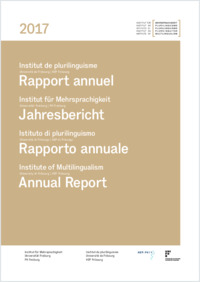Institut de plurilinguisme : rapport annuel 2017
BLE-BLL
-
2018
79
English
French
German
Italian
2017 was a year marked by beginnings and endings, with several long-serving staff members leaving the Institute for a new professional challenge. From our point of view, it is good news when scholars employed at our Institute – whether for a short time or a longer term – find positions at other higher education institutions to continue their research in Switzerland or, as is often the case, abroad. Such dynamics are a constructive factor in developing our Institute’s networks and extending its thematic range. In addition to the departures, we also welcomed new staff at the doctoral and postdoctoral levels, partly in the scope of proven collaborations such as the cooperation with the University of Teacher Education Graubünden, but also in the framework of new projects and activities, for instance, the Centre for Foreign Language Didactics, which is continually expanding its scope. In 2017, new mandates as well as projects funded by FNS were added to our roster of projects in addition to those at the National Research Centre on Multilingualism, which represents a large part of the Institute’s activities; the annual report provides details on the various projects.
L’année qui s’est achevée a marqué un tournant pour plusieurs membres de notre équipe. Pour certains, employés de longue date au sein de notre institut, 2017 a été l’occasion d’accepter de relever un nouveau défi professionnel. Nous nous réjouissons que des chercheuses et chercheurs ayant oeuvré au sein de notre structure pendant une période plus ou moins longue se voient proposer un poste dans une autre université, souvent à l’étranger, et puissent y poursuivre leurs travaux. Cette dynamique est bénéfique à notre institut, car grâce à elle, nous pouvons développer non seulement notre réseau mais également nos axes thématiques de recherche. A côté de ces départs, nous avons eu le plaisir d’accueillir de nouveaux arrivants à des postes de niveau doctoral et post-doctoral. Ces nouvelles arrivées s’inscrivent soit dans le cadre de coopérations confirmées, telles que celle que nous menons avec la Haute Ecole pédagogique des Grisons, soit dans la réalisation de nouveaux projets et activités comme le développement du Centre de didactique des langues étrangères.
Das Jahr 2017 war geprägt von Anfängen und Schlusspunkten: Einige unserer langjährigen Mitarbeiterinnen und Mitarbeiter haben das Institut verlassen und neue Stellen angetreten. Es ist aus unserer Sicht erfreulich, dass die Wissenschaftlerinnen und Wissenschaftler, die an unserem Institut für kürzere oder längere Zeit arbeiten, an anderen Hochschulen, oft im Ausland, Stellen finden und dort ihre Forschung weiterführen. Auch diese Dynamik trägt dazu bei, dass unser Institut sich laufend weiter vernetzt und thematisch weiterentwickelt. Neben Abgängen haben wir auch Neuzugänge auf Doktoranden- und Postdoktorandenstufe zu verzeichnen, teils im Rahmen von bewährten Kooperationen wie etwa derjenigen mit der PH Graubünden, teils im Rahmen von neuen Projekten oder Aktivitäten, wie etwa dem sich laufend entwickelnden Fachdidaktikzentrum Fremdsprachen. Zu den Projekten im Rahmen des wissenschaftlichen Kompetenzzentrums für Mehrsprachigkeit, die einen grossen Teil unserer Aktivitäten ausmachen, kamen auch 2017 neue Mandate und SNF- finanzierte Projekte hinzu, wie der Jahresbericht im Detail nachweist.
Il 2017 è stato un anno di partenze e traguardi. Alcuni collaboratori di lunga data hanno lasciato l’Istituto per affrontare nuove strade. Siamo felici che molti ricercatori che hanno collaborato con noi per periodi più o meno lunghi si insedino in altri istituti, spesso all’estero, dove hanno la possibilità di proseguire i loro lavori: questa dinamica ci consente di continuare a tessere una rete di contatti e favorisce il nostro sviluppo tematico. Oltre ai commiati, segnaliamo l’arrivo di nuovi dottorandi e post-dottorandi, alcuni nel quadro di collaborazioni affermate, ad esempio con l’Alta scuola pedagogica dei Grigioni, altri di nuovi progetti o attività, come il Centro di didattica delle lingue straniere (Fachdidaktikzentrum Fremdsprachen). Per quanto riguarda il Centro scientifico di competenza per il plurilinguismo, il quale rappresenta un pilastro importante delle nostre attività, anche nel 2017 abbiamo ricevuto nuovi mandati e sono stati attuati progetti finanziati dall’FNS, come illustra nel dettaglio il nostro rapporto annuale.
- Faculty
- Faculté des lettres et des sciences humaines
- Department
- Institut de plurilinguisme
- Language
-
- French
- Classification
- Language, linguistics
- License
-
License undefined
- Identifiers
-
- RERO DOC 322698
- Persistent URL
- https://folia.unifr.ch/unifr/documents/306996
Statistics
Document views: 150
File downloads:
- Texte intégral: 276
